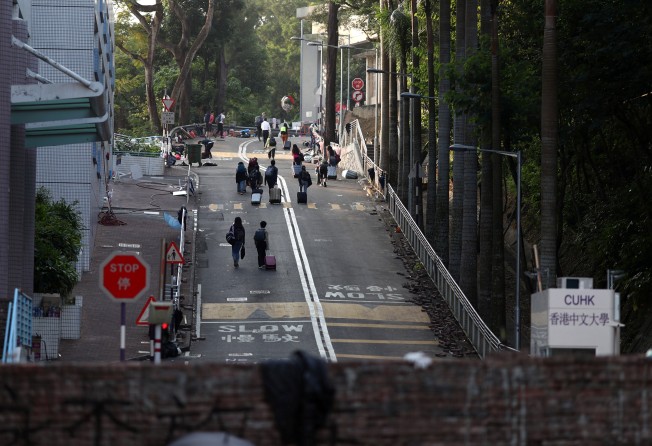Chinese students fleeing Hong Kong protests forego accommodation deposits
- Students from mainland make up bulk of non-local contingent at city’s universities
- Three mainland Chinese students forgo HK$88,000 in rent paid in advance, deposits

Mainland Chinese university students fleeing Hong Kong amid the ongoing anti-government protests are forfeiting huge deposits in the process.
Students from the mainland make up the bulk of the universities’ non-local contingent. In the 2016-17 academic year, 12,037 mainland students were enrolled at eight universities in Hong Kong, twice the number a decade ago, according to the Hong Kong government’s Audit Department.
And as semesters end early across the city, these students, worried about their safety, are cancelling their leases, sometimes at great cost.
This month, according to local Hong Kong media, three mainland Chinese students cancelled the lease for a flat in Tai Wai after living there for about four months, forgoing HK$88,000 (US$11,242) in two months’ rent paid in advance and other deposits.
Students from north of the border are often required by landlords to pay big deposits as well as a year’s rent in advance, as they cannot furnish proof of employment and income. And once a lease is broken, the landlord has the right to keep such deposits.
A mainland Chinese finance professional who only gave her surname as He, has lived in Hong Kong for five years and has been forced to look for a new flatmate after her old cotenant, a student at City University of Hong Kong, decided to leave the city in a hurry.
“I didn’t expect she’d want to give up her two-month deposit [worth HK$10,000],” He said. The pair lived near Hong Kong Polytechnic University, which is popular with mainland students, in Hung Hom, Kowloon.
The university was also the site of some of the most violent clashes between protesters and police.
“She got a bad impression of Hong Kong once the protests began,” He said of her flatmate. “The protests at City University were getting worse, to the extent that black-clad protesters were handing out campaign materials and masks, and got angry with those who did not accept these. There have also been clashes on campus over speaking in Mandarin. So, she insisted on leaving Hong Kong.”
WeChat groups and online forums He joined in her search for a flatmate had thousands of posts advertising for tenants. “Hong Kong rental group No. 10”, a WeChat group He joined, had 471 members. Some students leaving Hong Kong are also subletting their flats and living spaces. On Gter.net, a Chinese online forum for studying and living abroad she signed on to, about 1,900 sublet posts have been made since November 1. Several posts emphasised the neighbourhoods that flats were located in were safe. Some posts even offered discounts of as much as 15 per cent for sublets.
“My worst-case plan is that if I cannot find a flatmate, I will tell the landlord that I will also move out. I might lose some of my deposit – I will speak to the landlord to see if I can get some of it back,” He said.
K, who did not want to reveal his identity, is also a member of a WeChat rental group. A Chinese University of Hong Kong graduate who has lived in Hong Kong for six years, K was looking to sublet the extra bedroom in his flat in Tai Wai, another area favoured by the mainland Chinese. His flatmate returned to Shenzhen after seven years in the city.
“He had been planning his start-up all along, but the Hong Kong protests accelerated his departure. Whether he would take up permanent residence in Hong Kong or not, would depend on what happens next,” K said.
The departures will also affect Hong Kong’s rental market, which is already feeling the impact of the protests.
“It is not the peak season like the summer holidays, so it is not the peak period for mainland students to rent. On the contrary, due to the social unrest, some mainland students have temporarily returned to China and terminated their leases,” said Derek Chan, head of research at Ricacorp Properties.
Ricacorp data shows there were 762 rental transactions in the 50 estates it looks at in September, 24 per cent lower than in August. This was the second consecutive monthly decline and was the lowest in the past seven months. The average rent reached a five-month low of HK$36.76 per square foot, 1.9 per cent lower than August, which is the largest monthly drop in 44 months since February 2016.
“It is estimated that the rental trend in October and November will be downward still. On the one hand, it will be due to the low-rent season, on the other, because of the relaxation by the government of restrictions on first-time mortgage purchases,” Chan said.